
I’m an ordinary guy from an ordinary family background but with dreams! Like crazy visions and goals. I got an ordinary academic score that was not enough to get into extraordinary universities to get top-class education and a well-paid job.
What should I do now?
Use my ordinary life as an excuse to settle for less, or take the challenge at hand and do the best I can with whatever I have whenever I have it.
Every day, I and many of you feel as if we're supposed to be special, with special abilities to accomplish special things. Even if we don't have a high IQ, we still have dreams, time, and energy.
If you're anything like me, you're probably wondering how we can make the most of our existing abilities while also learning new ones.
Productivity appeared as a small light at the end of the tunnel, hard but worth every single effort.
In pursuing my dreams, For the past 3 years, I’ve read 25+ books, watched multiple courses and seminars, and read hundreds of articles.
Then I tried to implement it in my life. I took action on creating habits and systems. Some of the things worked and some didn’t. Gradually, and continuous learning and improvement I completely changed myself, for good.
Let's do one little thought experiment.
If I spend time on my phone browsing and scrolling, will you think I’ll end up failing? Not getting that job I want? Not pursuing a hobby I’ve always wanted?
It's 100 per cent yes, right? What If I don’t use my phone wisely?
If I use the same phone for activities like reading, watching online courses, studying, taking notes, creating to-do lists, tracking habits, and working towards my goals?
Don’t you think I’ll have different results with the same phone? I certainly think yes. I can study, learn new skills, and work on my hobbies.
If we can waste ourselves by wasting time, then we can certainly improve ourselves by investing that time.
I don't see the point in writing down the top ten ways to improve your productivity by searching Google and using the top results to create a 2,000-word post. It won't be the best use of my reader's time.
I got some good results through trial and error, and now I’m trying to share my journey and what worked for me. These are no secrets; just a few simple things I have tried and tested myself, that we can implement in our current lives. Simple doesn’t necessarily mean easy.
If you're a college student looking to improve his academic performance, anyone who wants to work on side projects, an employee who wants to carve out time from his busy schedule to improve his skills, or anyone in particular who believes they don't have special talents (yes, you do, you just haven't looked hard enough).
Ok Google, how to improve productivity?

If you search on google, you’ll find well-written articles, books, 100s of videos, training, and seminars available for free or at a price of a T-shirt.
Instead of constantly trying out new hacks and tips, we should focus on changing our philosophy and habits. This will create lasting change in our lives.
What does productivity mean? As always, It means different for different people.
Jason Fried, the co-founder of 37signals in his tweet says that:
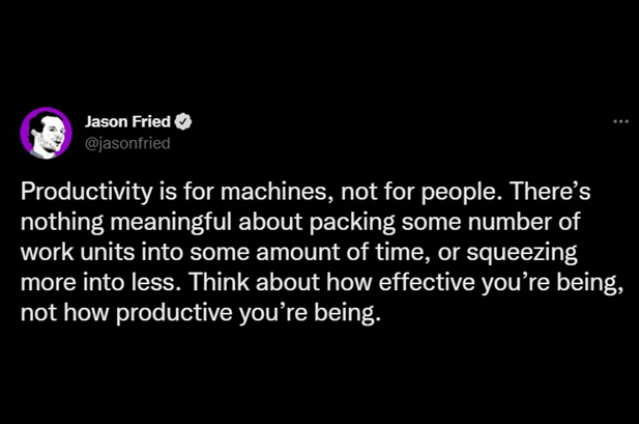
What I mean by productivity is doing what we can and doing the best we can with our existing talent, skills, and resources.
What I don't mean is how to work for 9 hours straight, how to work faster than a person with four arms, or how to complete a week's worth of work in a single day. It is also not about accomplishing something significant by working 25 hours on one day and doing nothing on the other days.
It's about doing small progressive things every day consistently, where there's an intuitive desire to work and create something.
Somehow we manage to find time to complain about not having time for our hobbies, but not to work on them, no matter how small.
This is from Tim Urban’s best articles that I always revisit.
On average, we get 16 - 17 hours of sleep after sleeping. That is the equivalent of 1000 minutes. Think of those 1,000 minutes as 100 10-minute blocks. So, how do you intend to use them to achieve your objectives and improve your skills?
We are not going to get that freedom of separate hours for our deepest desired passion or hobby. We need to carve out them ourselves.\
Self-Improvement or Illusion?

Productivity is a popular search term that marketers and content creators target for SEO purposes. However, just because something pleases you does not always imply that it is useful. We will end up consuming less nutritious and lower-calorie information.
We love to see magic even when we know back in our minds that magician playing some trick with his hands that our eyes can’t pick.
Yeah, it looks cool, but in reality, it was just an illusion. I feel like the same stuff goes for productivity and self-improvement. The magic of words flown from motivational and inspiring videos we see on YouTube makes us go wonder and arouses the responsible person inside us to do something about our situation.
But it doesn’t last very long. In a while everything starts to fade, we move on to another video, watch another person playing his magic tricks, again get excited and again lower.
It's easy to feel like growing in the illusion of growth. Information isn’t worth a penny if not acted upon.
Understandably, people in the past didn't have access to the same resources we do now. But we still have to wonder why most of us aren't successful.
If information is not converted into knowledge, becomes pointless or even dangerous, a condition known as information overload.
Most of our problems are caused by the inability to act. The reason for not acting is that we are waiting for the perfect opportunity, perfect time, and perfect plan, which never comes.
“If I only had an hour to chop down a tree, I would spend the first 45 minutes sharpening my axe. ” – Abraham Lincoln
But sharpening the axe without ever cutting a tree, is meaningless.
There's no need for a perfect path from the beginning. We can start with the basics and improve over time. Those who are clever and genius will end up well in their field, but that doesn't mean it'll happen for us too. However, that doesn't mean we can't do anything about it.
It's not about finding the path but creating one. Whichever path you take will be unique and special for you.
Mindset as Hardware and Habits as Software
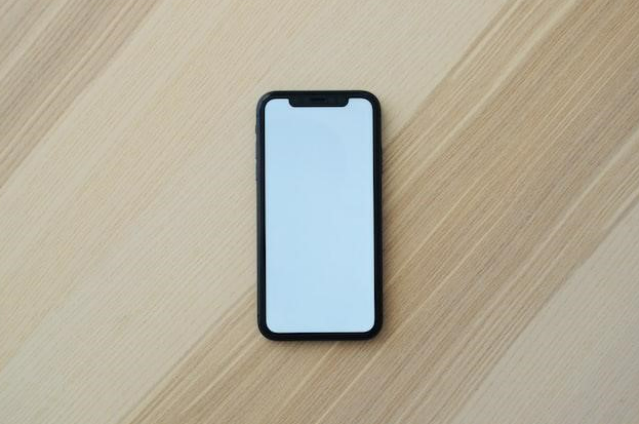
I like to use this analogy to explain concepts about self-improvement.
Imagine your mindset, philosophy and attitude are the hardware of a device with your habits and routines being the software. An older phone trying to run the latest software and apps is likely to freeze and not work. The device would display an error message that reads "Unfortunately, it has stopped."
So what on earth does this have to do with productivity?
In this context, hardware refers to your philosophy and mindset. You can't run new software i.e.new habits and routines until you change or better upgrade them.
“Look, if you want things to change, YOU have to change. If you will change, everything will change for you." – Jim Rohn
For example, when I wanted to start exercising, I focused on doing heavy workouts and pushing myself every day, but it didn't last.
Later on, I changed my attitude toward my health.
My health will be with me until the day I die, so it's not about getting lean and looking fit, but about feeling energetic and living a longer life. I have good health and want to keep it. I knew I had more than half of my life ahead of me and there was no rush; I'm not doing it for external rewards.
Everything changed after that. Now I'm exercising regularly and in good health.
Think in terms of Weeks and Days
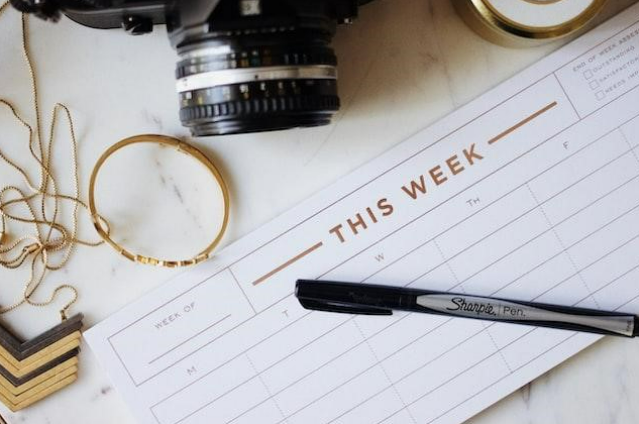
Forget for a moment about the 10-year, five-year, or even one-year vision.
Consider this - if an exam is only given once, you will only be able to revise your attempts and improve your results once, whereas if the test is given twice, you will have two chances.
Try to think about your life in the same way. If you think in years, you'll only have 70-80 chances to improve. However, when you think in terms of weeks and days, you get higher numbers and chances.
We also can't predict what will happen in a year, let alone a month. However, for weeks, we can have some predictability in planning out our mini goals, and days have a structure to take daily steps towards that mini goal.
Goals are for results, the system is for the process.
Your success is a reflection of what you do every day.
People on the outside will describe it as an overnight success and will wonder how you got there. But you know deep down that the outcome was the sum of all your days.
Problems to Projects
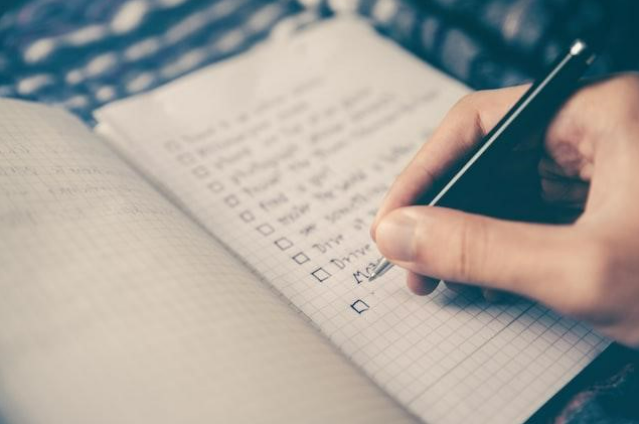
You've probably noticed that whenever we sit down to do something important, such as reading, studying, or working on a project, our minds begin to roam to the thought that we had other things to do, and that task is still pending.
There was nothing until we started playing the game, but as soon as I started reading that chapter, I began to feel thirsty, hungry, tired, and sleepy, and I began to think about the next chapter I needed to study even before I finished the previous one.
David Allen refers to these background tasks as "open loops" in his book "Getting Things Done," which continue to run inside our minds even if we never start working on them, draining our energy.
So what he suggests we do about such open tasks is to be like water.
Be water, my friend. –Bruce Lee
Allow the thought to come and capture it for later use. This is also related to a distraction journal. We don't react to our thoughts right away; instead, we save them in a safe place so that we can work on them after we finish the tasks at hand.
What I like to do is what I call a creative dump for which I have written a separate post.
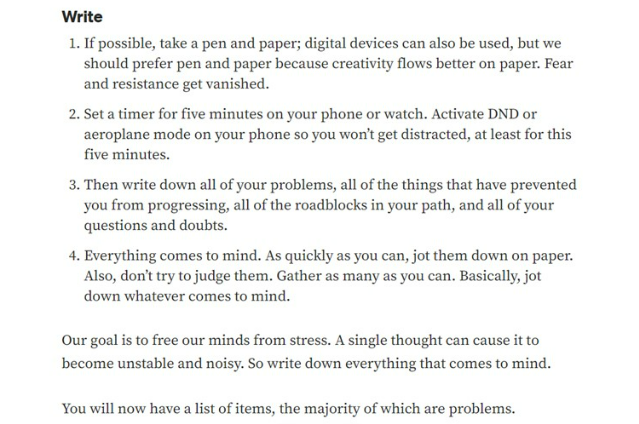
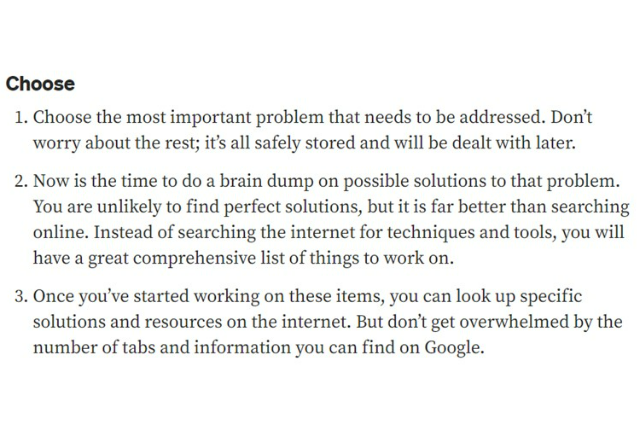
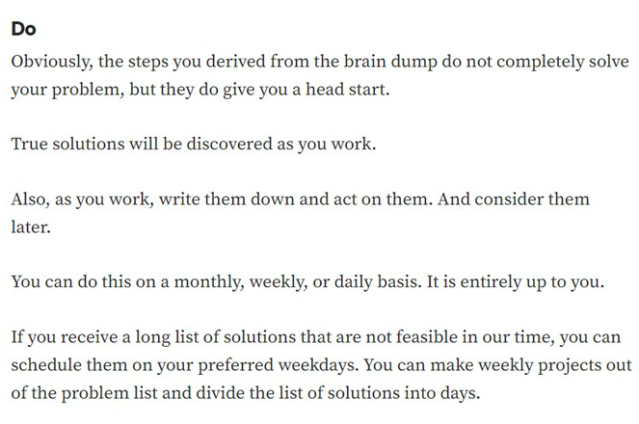
Minimum Viable Productivity
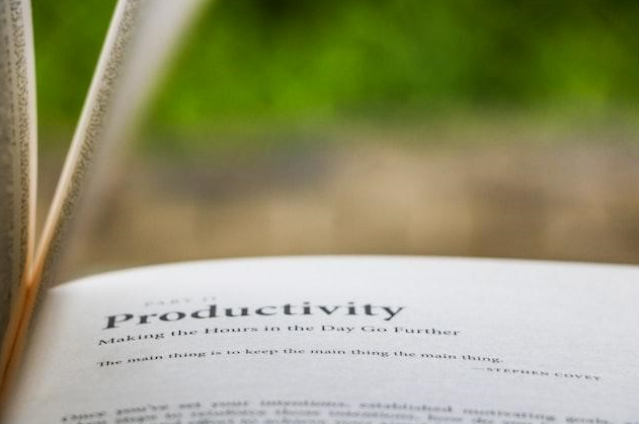
If you were looking for tips and tricks, this is it. I believe in simple ideas that are actionable and effective. If I were to keep reading without doing anything, I'd rather watch movies or play games; at the very least, I'll have fun in the present.
It's challenging to adapt someone else's routine into our own, even though how simple it feels.
Begin doing something and consider whether it is your thing or not.
Developing self-discipline and commitments does not imply being rigid and working every second of the day, but rather having the freedom to do what we want.
That's why I limited myself to a few small steps that can be implemented and tested in a week.
Using Pareto's principle, We will start with 20% of the stuff that will result in an 80% increase in our productivity.
1. Environment
Some say willpower is limited and some say it doesn't exist at all.
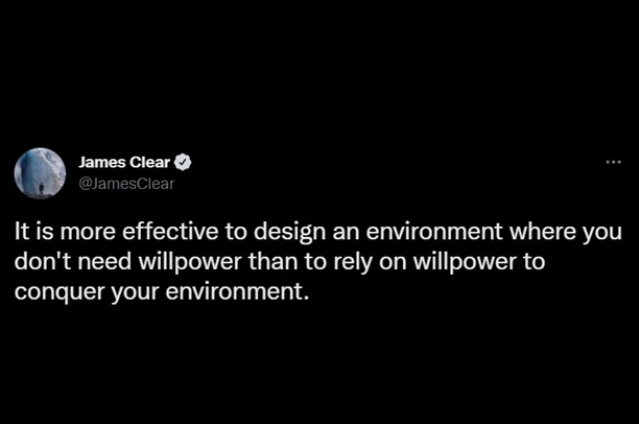
I think the environment is the key when it comes to managing yourself. It’s not always about our conscious thoughts and actions but also our subconscious mind where some of our actions are triggered automatically which can break or make our success.
It's hard to eat healthy when there's chocolate on the counter and apples in the fridge. Keep apples on the counter and chocolate in the fridge, and you're more likely to make healthier choices.
A slight change in our environment can work in our favour.
Adding cues to the environment and stacking habits can in building new habits.
Brushing our teeth is a daily habit that we rarely miss Even if we are rushing, we will brush our teeth before leaving.
What I like to do is keep my toothbrush and my exercise mat next to each other to trigger the next habit.
Now before brushing my teeth, I first exercise.
This is an excerpt to give hint about decision fatigue.
Prisoners with earlier parole hearings are more likely to be given parole than prisoners with afternoon hearings, due to judges suffering from decision fatigue by afternoon time. The decision fatigue causes judges to choose the default option typical in parole hearings, which is to deny parole.
Similarly, if we spend our decision-making energy on what to wear, what to eat, and other trivial thoughts, we will be drained and end up in the wrong place.
2. Distraction
If someone asks how much time you check your phone, we'll say maybe 10-15 times a day. But in truth, it's more than 70 times. We check it every hour we get that notification.
You Have a Slot Machine in Your Phone & How It's Fing Up Your Ability to Focus With Dr*. Cal Newport, Deep Work
There are numerous techniques for reducing phone distraction.
What worked for me is to don’t having social media apps on my phone. You can keep it on your pc or desktop but not on your phone where it is easily accessible.
Use aeroplane mode or DND mode for 15 to 30-minute blocks where you don't look at your phone and concentrate on your work; this will help you regain your lost attention span while also working on your project.
Keeping your phone silent will drive you insane, but nothing bad will happen if you don't touch it for 2 hours. Think again.
Reduce the number of apps you use most frequently. Yes. Rethink. Do they truly add value?
What I don't mean by focus is not fully concentrating on a very important thing. it is not having too many things running at the same time. Just finish one thing before moving on to the next. That's all there is to it.
We have our to-do list ready, so we can work on high-priority tasks every day without getting overwhelmed.
3. Practice and performance
Not its time to take action.
So practise is something we do with a guide, and performance is something we do without a guide or any resources, just our knowledge and experience.
When we practise for our exams, for example, we can use and refer back to our textbook until we get to the solutions. However, in the exam, which is in performance mode, we must come up with a solution from our brain.
The most important aspect of measuring our progress is performance.
You are not learning until you can do something on your own.
Nothing can stop you from getting better if you practise regularly. Make an effort to do something you've always wanted to do. It could be anything from writing blog posts to making videos to drawing and painting to learning a language.
Improving 1 per cent 30 times is much easier than Improving 30% in a single time.
Because inputs are the only thing we have control over, the rest of the output and results will take care of themselves.
When you measure, you can see progress. The compounding effect will make that progress exponentially over time. You have no idea how this small incremental habit of yours turned out to be the most significant achievement.
If you get one per cent better each day for one year, you'll end up thirty-seven times better by the time you're done. – James Clear
Positive Feedback loop
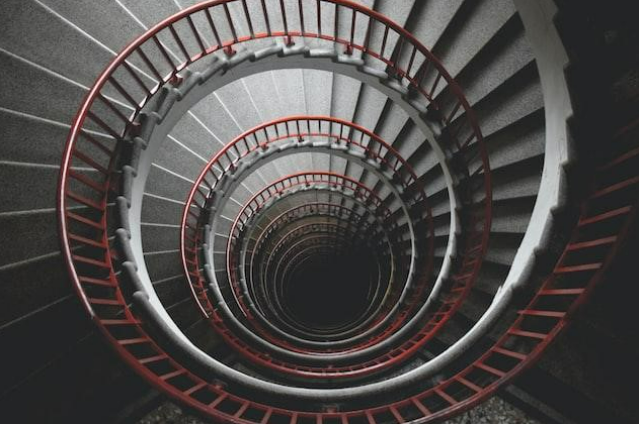
It is nearly impossible to continue working if you are not receiving anything in return.
Of course, just because we're good at something and passionate about it doesn't mean we won't experience pain and stress.
But what should we do when our efforts pay off in the future? How can we incorporate delayed gratification into our everyday lives? How can we be rewarded for our efforts?
Jerry Seinfeld's famous trick to tackle this problem
Get a big wall calendar that has a whole year on one page and hang it on a prominent wall. The next step was to get a big red magic marker. He said for each day that I do my task of writing, I get to put a big red X over that day.
“After a few days, you'll have a chain. Just keep at it and the chain will grow longer every day. You'll like seeing that chain, especially when you get a few weeks under your belt. Your only job is to not break the chain.”
What's great about this method is that we get a small dose of reward right now. This results in a positive feedback loop that builds momentum.
Please share with your family and closest friends. They will undoubtedly appreciate whatever you did, which will subconsciously boost your confidence in your ability and encourage you to do more of it.
“Fun is looking for the variability in something other people don’t notice. It’s breaking through the boredom and monotony to discover its hidden beauty.” – Nir Eyal,
Don't just feel special; do something special. Something is special when you put your heart and soul into it, and something is special when you can't take your eyes off it.
When you are pleased with your work, journal about it. Use it as a repeatable system over and over.
Exhaustion and Burnout

The very thing that helped us come out of the darkness of anxiety can work against us. That’s what happened to me, multiple times.
Yes, I’m talking about burnout and overload.
Be watchful of negative feedback loops as well.
It usually occurs while developing an exercise habit.
The brain sends stress neurotransmitters when we work beyond our limits, which creates a displeasure effect. Our brain does not want to keep doing such work.
Now I work in chunks. As previously discussed, working in 15-30 minute increments can help us excel in our abilities.
If you track your day, you will discover that we do not work 5-8 hours per day. Unless we are superhuman, most of us can usually focus for 30 to 50 minutes.
When done incorrectly, productivity has negative consequences. That can happen to any of us, and it certainly did to me.
We discussed earlier in the creative dump that there is a possibility that we can do everything because we have captured so many things that seem important to us in the future. As a result, we have a massive backlog of unfinished business.
We must decide what we will explore in depth.
Working at the surface level will not get us to the heart of that discipline and specialisation. The topic's shallowness will make us less confident and require more bandwidth, leading to burnout in our daily lives.
“Sometimes what you don’t do is just as important as what you do.” ― Greg McKeown
Conclusion
We can't love ourselves without working on ourselves, and we can't work on ourselves without loving ourselves.
We are not competing, nor are we defeating anyone. We are all significant. We each have a unique genius within us. And improving ourselves and our products can assist us in solving the world's most difficult problems.
More than just engineers, doctors, and other intellectual pursuits exist on our planet. Yes, the monetary value varies depending on the industry, but that doesn't mean we and our work aren't valuable.
Everyone can benefit from self-initiation. If everyone can find something to work towards and benefit from because it is necessary for the earth, the world will be a better place.
Take Action (These are the things you can do today)
- Change your approach to your work.
- Capture daily life issues in the distraction journal and turn them into projects and mini-projects.
- Begin with just 2 minutes. Create momentum. Then you can improve. We can't improve something that isn't built.
- Measure its progress in terms of time, result, and difficulty.
- Consider the previous day and try to benchmark it to gradually improve.
- Take a break. Sleep. There is plenty of time.
"You are capable of doing anything, but not everything." - Greg McKeown
. . .
Sources:
- https://twitter.com/jasonfried/status
- https://waitbutwhy.com/2016
- https://mayurgharat.medium.com
- https://www.mindtools.com/pages/article
- https://thedecisionlab.com/biases/decision-fatigue
- Indestructible: How to Control Your Attention and Choose Your Life
- https://twitter.com/jamesclear/status
- https://jamesclear.com
- https://jamesclear.com/continuous-improvement
- Essentialism: The Disciplined Pursuit of Less
